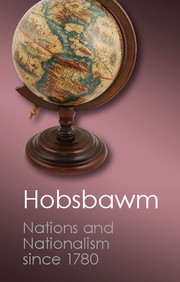Book contents
5 - The apogee of nationalism 1918–1950
Published online by Cambridge University Press: 05 July 2014
Summary
If there was a moment when the nineteenth-century ‘principle of nationality’ triumphed it was at the end of World War I, even though this was neither predictable, nor the intention of the future victors. In fact, it was the result of two unintended developments: the collapse of the great multinational empires of central and eastern Europe and the Russian Revolution which made it desirable for the Allies to play the Wilsonian card against the Bolshevik card. For, as we have seen, what looked like mobilizing the masses in 1917–18 was social revolution rather than national self-determination. One might speculate on what effect a victorious all-European revolution might have had on the nationalities of the continent, but such speculation is idle. Except for Soviet Russia, Europe was not reconstructed on the basis of the Bolshevik policy on the ‘national question’. Essentially the continent became, for the first and last time in its history, a jigsaw puzzle of states defined, with rare exceptions, both as nation-states and as some kind of bourgeois parliamentary democracies. This state of affairs was extremely short-lived.
Inter-war Europe also happened to see the triumph of that other aspect of the ‘bourgeois’ nation which was discussed in an earlier chapter: the nation as a ‘national economy’. Though most economists, businessmen and western governments dreamed of a return to the world economy of 1913, this proved to be impossible. Indeed, even had it been, there could have been no return to the economy of freely competitive private enterprise and free trade which was the ideal, and even part of the reality of the world economy in the heyday of British global supremacy.
- Type
- Chapter
- Information
- Nations and Nationalism since 1780Programme, Myth, Reality, pp. 131 - 162Publisher: Cambridge University PressPrint publication year: 2012



